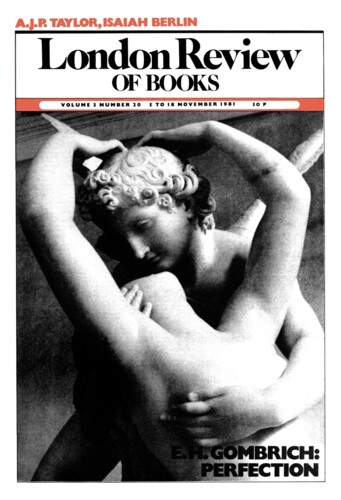Isaiah Berlin
Isaiah Berlin a fellow of All Souls College, Oxford, was President of the British Academy until 1978.
Isaiah Berlin responds to the foregoing criticisms of his work
Isaiah Berlin, 5 November 1981
Professor Aarsleff kindly sent me a copy of his article before publication; his courtesy enables me to provide an immediate rejoinder. I read it with mounting astonishment. Since I know Professor Aarsleff to be an erudite and scrupulous scholar, I find it difficult to understand what moved him to protest so vehemently that Vico’s view of language, which lies at the heart of his system, is wholly lacking in originality. I can only surmise that, irritated by the sudden appearance in the main path of the Enlightenment of this unwelcome intruder, with his unscientific etymological theories and the value put on them by his admirers, Professor Aarsleff simply wants him out of the way. The claims (which Professor Aarsleff regards as totally hollow) advanced by most students of Vico’s ideas, and indeed by himself, for regarding him as a boldly original thinker, spring from the belief that no one before him had said that it was only the study of the evolution of language, myth, ritual and other social institutions that made it possible to reconstruct in some degree of concrete detail the mentalities and outlooks of primitive societies and to trace the patterns of their development, stage by stage. This could, in Vico’s view, be achieved by examining men’s attitudes to God, nature, one another, and in particular their self-images as these are embodied in social institutions, especially in forms of language and of religious and artistic self-expression, connected in his mind with class conflict and social tension: these institutions provided the most vivid and accessible evidence of cultural growth. Vico stressed that his method of imaginative insight into what the world must have looked like to men, especially in early times, who wrote, spoke, worshipped, fought, dispensed justice, created works of art in specific ways, differed in principle from the methods commonly employed by natural scientists and those influenced by them in his own time.
Vico and Berlin
5 November 1981
Pieces about Isaiah Berlin in the LRB
Self-Amused: Isaiah Berlin
Adam Phillips, 23 July 2009
Isaiah Berlin was returning from Paris in 1952 when the aeroplane – ‘it was an Air France: Air Chance is a better name’ – ‘caught fire and scenes of extraordinary...
The trouble with the Enlightenment
Mark Lilla, 6 January 1994
In his distinguished career as an intellectual historian, Isaiah Berlin has established himself as our foremost collector of stray philosophical puppies. Vico, Herder, Maistre, and now Hamann:...
England’s Isaiah
Perry Anderson, 20 December 1990
Intellectual hero to Noel Annan, whose political heroine is Margaret Thatcher, should Isaiah Berlin be left to the – ‘unfashionable’ – enthusiasms of Our Age? Or consigned...
Dream of the Seventh Dominion
Stefan Collini, 4 December 1980
At All Souls in 1932, Lewis Namier provoked Isaiah Berlin by scornfully dismissing the history of ideas – dismissing it in German, though the rest of the conversation (or rather harangue)...
Read anywhere with the London Review of Books app, available now from the App Store for Apple devices, Google Play for Android devices and Amazon for your Kindle Fire.
Sign up to our newsletter
For highlights from the latest issue, our archive and the blog, as well as news, events and exclusive promotions.

